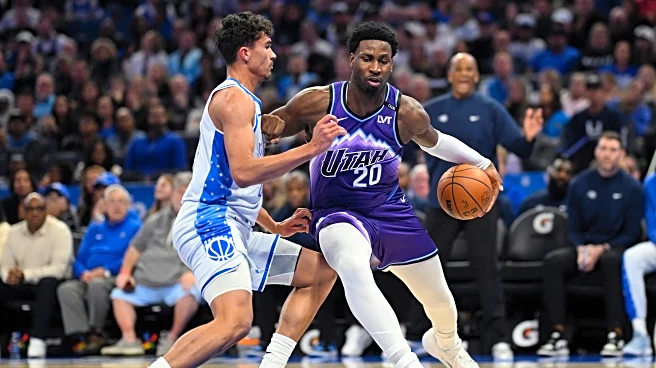
PHILADELPHIA - Josiah Harris didn’t need to take any visits, or entertain any offers to figure out where he would play his last season of college basketball.
On the very first day that the transfer portal
opened, Harris announced his commitment to La Salle, tagging along with his head coach Darris Nichols making the transition to the Atlantic 10 from the Big South and Radford, where he spent the last four seasons coaching.
For Harris, not only has he thrived playing for Nichols, but his connection to his coach has allowed him to have stability in a college career that has seen him play at soon to be five different schools.
The forward epitomizes what it is when people say a late bloomer. In fact, he only started playing organized basketball as a high school sophomore - but that doesn’t mean that you couldn’t find him on a court somewhere.
Instead of playing in a high school gym, Harris was always playing street ball on the outdoor courts in his hometown of Wilmington, Del., less than 40 miles from where he’ll now play at Glaser Arena on the campus of La Salle University.
It was an adjustment for Harris moving from playing outdoors to his high school hardwood, as he played on the JV team as a junior. However, he points to that junior season as a crucial time for his development as he gained valuable reps and started to pick up concepts.
“I’ve learned a lot since my junior year to now,” he said. “I felt like if I had played earlier, my IQ would have probably been higher.”
There was a lot for Harris to learn, a lot that playing on pavement couldn’t teach him.
“I didn’t really grasp things and had to get used to a lot,” Harris said. “What was challenging was remembering set plays and knowing how to communicate on the floor… One of the parts I was stuck on and didn’t know was how to rotate on defense and things of that nature.”
As Harris gained reps on the court, he played on the varsity team as a senior, and he felt like he was ready to start to come into his own. Even if that meant playing a role and giving a lift to the team when they needed him. The buy-in to playing a role made him a team captain for his final season at William Penn High School in New Castle, Del.
“I started playing my senior year, and I thought to myself that I could be a good player,” he said. “I felt like I did a terrific job coming off the bench a couple times. I sparked the team with a lot of energy.”
As Harris graduated high school, he wanted to play basketball at the collegiate level, feeling that he was just scratching the surface of the player that he could become. There were a couple offers from Division-III schools, but not much else. He and his high school coach then sent his film around, where it landed into the hands of Tommy DeSalme at Cowley College in Arkansas City, Kan., just north of the Oklahoma border.
Harris jumped on the opportunity to continue to grow as a player but also saw it as an opportunity for personal growth to move away from home and be on his own.
“I wanted to be able to grow up on my own a little bit,” Harris said. “Going out there to Cowley, Coach [DeSalme] helped me a lot to grow my career.”
Harris did all of this while the COVID-19 pandemic was going on. He had to adjust to an ever-changing way of life just as the whole world did. Masks, sitting six feet apart, and playing games in gyms where it was just his Cowley College Tigers and their opponent was different for everyone, but Harris was experiencing all of this while halfway across America from his hometown.
Harris had dealt with a lot of changes and newness in the infant stages of his basketball career. Following the pandemic-riddled season at Cowley College, he picked up and moved again. DeSalme took the head job at Hutchinson College, just under a two-hour drive from Cowley. Harris followed him to Hutchinson, and although he changed locations, following DeSalme would be the first time in his basketball career that he’d have the same head coach two seasons in a row.
Harris doubled his playing time and made 16 starts in his year at Hutchinson. He helped the Blue Dragons earn a bid to the NJCAA Tournament.
Harris’ continued to grow on the court, and then wanted to seek out an opportunity to move up to Division-I. Just as it was in high school, opportunities were scarce for Harris, but all he needed was a chance.
He got one and only one, from Saint Francis University in Brooklyn Heights, N.Y. Once again, he packed his bags on his way to another spot. This time, for the bright lights of New York City, a far cry from the tiny Kansas towns where he had spent the last two years.
Harris immediately became a key cog for the Terriers, making his presence felt on the boards and at the rim. St. Francis had the highest block percentage as a team in the NEC thanks to Harris patrolling the paint. He alone had the fourth highest block percentage in the league.
He was a vacuum for rebounds as well, finishing third in offensive rebounding percentage, and first in defensive rebounding percentage. There weren’t many guys who cleaned the glass in America better than him.
Towards the end of the season, Harris had in mind that he would transfer to pursue another opportunity. However, he wasn’t given a choice after receiving an email from school administration, calling for an all athletes meeting that same day. Harris and his peers were informed that the school would be shutting their doors at semester’s end. Although Harris planned on leaving, now he had to.
So once again, he popped open his computer, ready to send his film around to other Division-I programs.
He sent his tape to three or so schools.
Then he got his message returned by Nichols at Radford.
He stopped sending out film, and stopped responding to other schools interested in him. He was set on Radford University to play for Nichols.
“Once Coach Nichols responded to me, I never went back and responded to emails,” Harris said. “I just felt a connection and that I could really do well there.”
For Harris, he felt that the small school on the banks of the New River was the best place for him basketball wise. However, his relationship with Nichols off the court was a major factor for choosing Radford (and ultimately La Salle later on).
“I’d go to the coaches office almost everyday to talk about ball, to talk about life,” Harris said. “Besides coaching, Coach Nichols is one of the realest people that I’ve ever met.”
Harris admired that for a guy who would hold his players accountable on the court, he was approachable and relaxed off of it.
However, when it came time for practice or a game, Nichols was real with his players, telling them what they had to hear, not necessarily what they always wanted to.
He recalled a team meeting during a losing streak during Big South Conference play, where Nichols made every player write down what his role on the team was, stand up, and announce it to the room. If Nichols didn’t hear what he was looking for, then he would let you know.
Given Nichols’ connection to his players outside of basketball, the players knew he had their best interests at heart, and that any rebuttal from Nichols was coming from the right place.
In two years playing for Nichols at Radford, Harris remained dominant blocking shots and rebounding. He finished top-five in the Big South in rebounding percentage on both ends, and finished the 2024-2025 season in the top-five in block percentage.
The 6-foot-9 post displayed the toughness that Nichols demands of his team, and it showed up in the stat sheet. Ask Harris where that comes from, and he’ll tell you it’s from his home state and his father, who played his college ball at Shaw University in Raleigh, N.C.
“It’s from Wilmington,” he said. “My dad has that dog in him, and I got that dog in me. I get it from Delaware.”
After Nichols was named the head coach at La Salle in March, Harris sensed it was time to move again. Only this time, there was no need to send his film anywhere or be his own personal recruiter. Harris didn’t need to take visits or post a graphic of his final couple schools that he was deciding on. Wherever Nichols decided to call home, Harris would do the same for his final season of eligibility.
Harris committed to the Explorers on the first day the transfer portal opened. He never for a second thought otherwise and gave the credit to his coach.
“It says a lot [about Nichols], Harris said. “That’s how much I trust him. I wouldn’t want to go to a new coach and have to learn a new system.”
Now, Nichols and Harris are at 20th and Olney, gearing up for their first season with the Explorers, and Harris’ last as a college basketball player.
Harris’ basketball journey has taken him on a winding road, one that a someone who spent his days hooping outdoors in Wilmington, Del., could have never envisioned.
“I come from a small state and not a lot of people make it out,” he said. “If I would have thought back to where I was as a junior in high school, I wouldn’t think that I would be here today.”
More from midmajormadness.com:
- These teams should move up to Division I, ASAP
- Introducing the Mid-Major Madness Coaching Contract Database
- Former NC State standout Julius Hodge passes lessons onto his players at Little Rock
- Cinderella Watch: Stephen F. Austin Lumberjacks
- WAC makes expansion official, adds 5 new schools
- College Basketball’s oldest player: Chattanooga’s Josh Ayeni still just ‘wants to win’
- OFFSEASON CONTENT GENERATOR: Fond memories of early 2000s PBS cartoons













